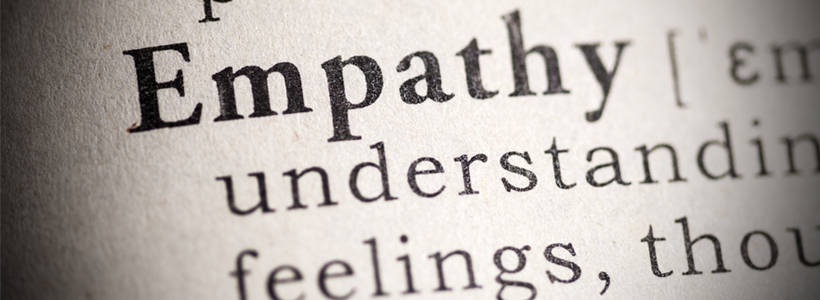
Bill English, Artistic Director
I’ve spoken a lot about empathy. And about how our theatre is an empathy gym. Where we come to improve our powers of compassion. But what does that actually involve? We all know what a work out at our physical gym requires. If we really want to get in shape, it is going to hurt. The more desire we have to improve the capacity of our muscles, the more pain we will feel. We push ourselves until our muscles scream, knowing that we will be stronger next time.
When I think about it this way, it becomes clear why empathy in our world today is in such short supply. It isn’t always fun. To really feel what others suffer is painful. When we enter a character’s grief, her sorrow, his remorse, we kindle those feelings in ourselves. If all the circumstances in the theatre are just right, the lighting, the music, the acting, our hearts will jump to life and ache with the characters as they yearn, and suffer and hope. It hurts us like it hurts them and we feel joined with their humanity.
In this way, I think going to the theatre is an act of courage. We go willingly, knowing we may suffer along with our fictional brothers and sisters. We throw ourselves into the ring, knowing we are likely to get our hearts bruised with sadness, knowing we may feel what it’s like to be humiliated, or marginalized, or abused. Of course, it is safe in the theatre, and like a dream from which we know we will awaken, we know our suffering will pass when the house lights come back up and we have woken to the real world. And the pain we feel for others is often tempered by inspiration we get from characters who courageously transform by facing their pain. We are ennobled by them. Their courage rubs off on us so that we are simultaneously humbled by suffering and lifted by courage. What a fabulous experience theatre can be!
Having put in our time in the gym, do we feel a bit more capable than when we went in, a bit kinder, more likely to identify with someone else? If we are avid theatregoers, can we expect our diligent work-outs to make us into the Olympic athletes of empathy? In the theatre, our empathy requires nothing of us, except perhaps to make a donation. But in life, once we really feel with someone, we need to take an action, to affect change, to put our money where our heart is? And yet I think we will all admit that the rush of compassion or inspiration we feel as we leave the theatre often washes off us as the tumult of daily demands lands. Are even actors, professional empathizers, who spend their entire careers feeling what others feel, necessarily better citizens? Kinder people? Actors and directors spend many more hours per day in the empathy gym than those in the audience. Are we more compassionate in daily life?
Carrying our theatre empathy practice over into our daily lives requires an even braver kind of commitment. The Lojong school of Buddhism says, “Turn all mishaps into the path.” The principle behind this slogan is that the troubles we run into once we leave our empathy gym are blessings and we can actually welcome them. This is pretty counter-intuitive, but irritation, resentment, anger, and all the unpleasant emotions that come our way can be looked at as opportunities. We may be hurting, but can our training from our theatre work-outs remind us that we can absorb and handle huge and overwhelming feelings. In the theatre, we have felt the grief of The Trojan Woman, the excruciating dilemma of Hamlet, the helplessness of Linda Loman to cope with her despairing Willy. When our own big emotions come up, can our theatre practice prepare us to cope? Can our immersion in symbolic trials help prepare us for the real ones? Or help us absorb the slings and arrows of outrageous fortune with returning fire? I think they can. If we come to the theatre bravely embracing not only the suffering, but the noble courage of the characters, we have exercised our own courage and not only can we become more compassionate to others but more capable of facing our own pain and more compassionate towards ourselves. If we really feel with our fictional brethren, they can send us home, prepared for what will come our way.




Thank you Bill. It was a very touching letter. It grabbed not only my heart but also my soul. See you at the gym.
Pp
Bill,
Being a good citizen requires empathy, but much more. Just because you empathize with Holocaust victims isn’t nearly enough. In addition to empathy, you need to have an understanding (i.e., a consistent, valid set of beliefs) about how the world works. This requires an understanding of history, economics (an important component of history), philosophy (in whatever form – theology, etc.), science, mathematics, etc. While I love the theater – and SF Playhouse, in particular – I think many “theater people” (including playwrights) have simplistic world-views that lead them off into the wilderness, spouting fire and silliness. I am pleased to have your empathy gym, just as I appreciate hearing sermons on Sunday, because it reminds me of core values that I too often forget or neglect. I’d like to be an “Olympic athlete of empathy,” and I have been helped by many of your productions. But empathy is only one component of good citizenship.
Bill, this is so well said reflecting several conversations we’ve had in recent months. We often experience vague disquiet when responding to news and personal issues or confusion in feelings that enhance frustration. Theatre helps clarify situations and provides options for actions. Sometimes it results in a simple decision to look at things in different ways. At other times more courage is required to engage with others, to organize, to contribute, or confront. I would look forward to a talk-back session following a play where the energy of the audience could be put to good use fomenting change.
As you so often do, your description of “real world empathy” is right on. It is tough sometimes to keep that feeling of connectedness we get from a great play when we return to real life. And the example of the counter intuitive Buddhist teaching is perfect for this discussion.
I love plays that make me squirm in my seat, with that uncomfortable, not quite sure where this is going feeling….I am in agreement with the comments of Dave Anderson when he writes that empathy is only one component of good citizenship.
I love reading your thoughts in these blog posts – it seems you have an uncanny ability to put into words what I have been feeling in a very eloquent way. Thanks…..See you at the Playhouse.